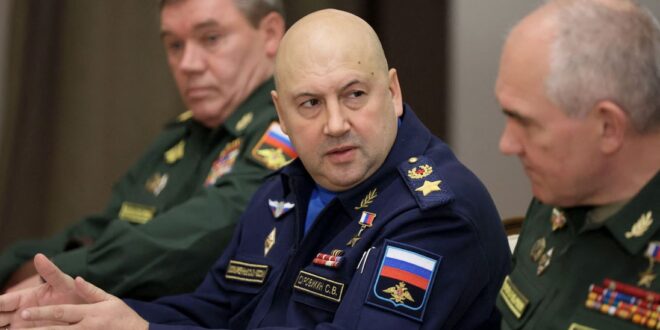ON OCTOBER 10th more than 300 towns and cities across Ukraine were hit with the largest Russian air bombardment since the early days of the war. It was a suitably grisly way of marking the promotion of Sergei Surovikin, Russia’s new overall commander in Ukraine. Nicknamed “General Armageddon” by his colleagues, he has a fearsome reputation hardened over decades. General Surovikin is believed to have directed the war for months—but his formal appointment on October 8th marks a cruel new chapter. Who is he, and what does his promotion reveal about the Russian invasion?
General Surovikin was born in the Siberian city of Novosibirsk in 1966 and started his military career in the 1980s with the Soviet special forces in Afghanistan. When hardliners attempted a coup in Russia in 1991, he was one of a tiny number of officers to follow their orders to attack pro-democracy protesters. He spent six months in prison after soldiers under his command killed three civilians; charges were eventually dismissed.
General Surovikin’s rise in spite of this troubling past is explained by his unflinching readiness to execute orders. He bolstered his reputation for ruthlessness during both wars in Chechnya, where he reportedly promised to kill three Chechens for every Russian soldier who died. His role in the Syrian war secured him a Hero of Russia medal, the country’s highest honorary title, and an unlikely promotion to head of the air force in 2017, despite having little experience of aviation. Two years later he led Russian forces as they began the bloody capture of Idlib province in north-west Syria. That campaign killed 1,600 civilians and displaced 1.4m people, according to Human Rights Watch, a pressure group. His experience in Syria—where Russia allied with the Syrian regime that unleashed chemical weapons on its population— also brought him closer to Yevgeny Prigozhin, whose Wagner Group of mercenaries fought in the war. In recent months, Mr Prigozhin had lobbied for General Surovikin’s appointment as the most senior commander in Ukraine.
General Surovikin took command of the southern front in Ukraine in June. He has orchestrated some of Russia’s most significant advances. But he has thus far failed to secure the Kherson region, where a Ukrainian counter-offensive has retaken more than 1,170 square kilometres of land since late August, according to Ukraine’s army. Nigel Gould-Davies, of the International Institute for Strategic Studies, a think-tank, says General Surovikin’s promotion is a “response to failure”. Officially, he is the first overall commander of the war. With his appointment, Russia seems to be trying to improve communication between its units. It may also be seeking a figurehead for disaffected troops. “The army needs a figure of a supreme leader to lead them into battle,” says Dmitry Adamsky, a professor at Reichman University. He believes General Surovikin could deliver this type of image.
The appointment will also appease a growing chorus of hardline critics who accuse the Kremlin of being too soft on Ukraine. As well as Mr Prigozhin, General Surovikin has been welcomed by Ramzan Kadyrov, the strongman leader of Chechnya. Both blame Sergei Shoigu, the defence minister, for Russia’s failures in Ukraine. Though General Surovikin was ostensibly Mr Shoigu’s choice, it is clear that Mr Putin made the decision. Britain’s defence ministry has called the general “brutal and corrupt”. This, combined with his extreme loyalty, makes him “the embodiment of the degeneration of the Putin regime,” says Mr Gould-Davies. If he fails to make his mark, his stint at the top could be as short-lived as that of the two previous de facto leaders of the war effort, Alexander Dvornikov and Gennady Zhidko. But if successful, he may have his eye on the top job in Russia’s army: chief of general staff.
Despite Mr Putin’s “partial” military mobilisation its army currently faces crippling shortages of equipment and manpower—not to mention morale. General Surovikin’s managerial skills will matter at least as much as his strategic decisions. He may introduce harsher punishment for dissenters and inflict terror on Ukrainians in an attempt to force submission. But for all the brutality it will unleash, the appointment is unlikely to reverse Russia’s battlefield humiliations.
 Eurasia Press & News
Eurasia Press & News




